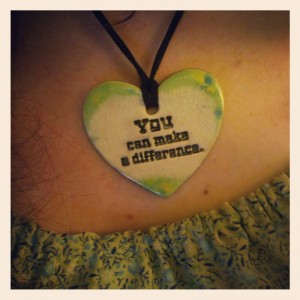 Rather than directly address the current discussion about sexism in skepticism I would like to tell a story.
Rather than directly address the current discussion about sexism in skepticism I would like to tell a story.
Last year, I wasn’t involved in skepticism at all. It wasn’t that I wasn’t interested. I had all of the books. I read all of the blogs. I had been teaching critical thinking in various forms for over a decade. Heck, I was even already planning my Carl Sagan-inspired tattoo. I was a skeptic. I just wasn’t active in the movement.
There wasn’t really a place for me in that movement. Or at least not one that I could see. It was all strong-willed and brilliant people, all of whom had a tendency to shout very loudly when they disagreed with people.
I can thrive in that kind of community. I had worked around vertebrate paleontologists and museum curators for long enough to know that I can elbow my way up with the best of them. However, I didn’t have the energy to push myself into a group like that, not again, not then. Plus, did I really have anything that I could add to the conversation? I wasn’t sure.
A year before that (why do these things always blow up in June? I’m not sure), I had not been involved in the science communication community either. Again, I owned all of the books. I read all of the blogs. I was already doing science communication in person and professionally. I just wasn’t doing it online.
In this case, the reason was a little different, but not very. You see, the science communication community is also filled with brilliant people, some of them shouting. Their shouts weren’t quite as loud or quite as angry, unless you mentioned “framing”, but they were still a bit intimidating. I didn’t think I had anything to add to that conversation either.
In each case, something happened.
In the case of the science blogs, “pepsigate” happened.
In the case of skepticism, “elevatorgate” happened.
And suddenly I found I had opinions. I found that these communities that I had read in much the same ways one reads the newspaper were no longer an impersonal and one-way path of information. Suddenly there was something happening that I wanted to say something about.
During ‘pepsigate’, I was already struggling with the idea of where I wanted to go professionally. Whether I wanted to stay at the museum job I loved, but paid nothing, or if I wanted to find something where the salary fit my qualifications more, but where I may not have been as philosophically comfortable. I started, quietly, saying things on twitter. Suddenly this gentleman whose blog I had been loyally reading, @canislatrans of faultline.org, was responding to me, listening to my comments and giving interesting answers. Then he was retweeting me, and other people started commenting, some of whom agreed with me, some of whom didn’t, but both those sides made me realize I had a voice that I could use to contribute. I started commenting more, and getting drawn more and more into this community. Then Bora DMed me and told me I should think about going to ScienceOnline. Honestly, I hadn’t thought about it. While I was talking with all of these people on Twitter, I still felt like I was a bit of a poser. After all, I had stopped blogging a while ago, and I had ever only marginally blogged about science before that. But my answer was “yes”, I would go.
Because someone had asked me. Because someone had listened to my voice and let me know that my voice was welcome.
In ‘elevatorgate’, it was a little different. I had a bit of an audience by that point, even if I don’t blog often. I was very active on twitter and was beginning to get to know some of the Skeptics, mostly the feminist crew. So when other skeptics started yelling louder and louder about how Rebecca was wrong to voice her discomfort, I tweeted several posts and got quite a few nasty comments back. Then I was asked, rathe snarkily, why I was bothering to spread these posts if that was all I was going to do.
That was when I realized that being a little bit involved was no longer good enough. It was time to stand up and say “I am a member of this community, and I need to do something to sway it a little closer to a community I *want* to be a member of. So I wrote My Privileged World. This post was unspeakably hard for me to write. I had written more strongly worded things elsewhere, but they were all pseudonymous. This time I was standing up, as me, and saying “This is my experience, and I have the ability to voice it.” I was still worried about being shouted down, and even more scared about my coworkers and/or boss finding it. I was shaking when I pressed submit, and I’ll admit that I cried about it.
Then people started commenting. Some of them were mean. Some of them were inappropriate. Some of them were incredibly rude, threatening or downright disgusting. But some of them weren’t. Some of them were affirmations of my point. Some of them were retellings of problems that those women faced, or sympathetic posts from people I barely knew (but who would come to be good friends).
Then someone, I don’t know who (I’m guessing it was Josh Rosenau, actually), asked if I was going to The Amaz!ng Meeting.
Like ScienceOnline, I hadn’t thought about it. I knew by this point that I was going to, somehow, become more active in Skepticism. I just didn’t know how. I had guessed it would be by blogging, and by joining a group in my area. That big conference full of brilliant people and loud voices hadn’t occurred to me as a place I would fit in. So I said “maybe”, knowing full well that I couldn’t justify the price, and that the registration cost of the conference alone would have completely broke my budget.
Then something else happened. Surly Amy and the Women Thinking Free Foundation offered a grant to women who were interested in going to TAM (link to this year’s program). I decided to apply, thinking that I would never get it, but still hoping. Instead of writing the kind of grant application that one tends to assume one should write for a grant application, full of seriousness and grand ambition, I used honesty and probably a little too much humor. I’m pretty sure I referenced Firefly, or at least Nathan Fillion at some point in it. I also said that I wanted to teach young women to think critically, and that one of my favorite things to do was to teach Girl Scouts about volcanoes. I really didn’t think I would get it, so I decided to just be me.
When I received the email saying was a grant recipient I squealed. Outloud. In my office. My office mate probably thought I was posessed.
It meant more to me than just the registration fee. It meant that not only did I have a voice in my blog, but there were people who believed that I was worth encouraging. It might not have been the majority of the community who listened to my voice, or who donated to make my trip a possibility, but it was enough. It was amazing.
So, ladies and gentlemen of the skeptical movement, keep speaking up in favor of inclusion. Keep pointing out things when you think they’re wrong or you think they should be changed. It may feel like you’re fighting an endless uphill battle against an enemy who would like to see you not only defeated but humiliated. It may feel as if you can’t deal with it anymore.
But even when you feel like you’re drowning in a sea of hatred, you aren’t. There are other people here who have your back. And there are even more that you’ve never heard of or heard from. Women and men who are watching this fight and saying “now wait a minute….” Women and men who will finally hit that breaking point and add their voice to the chorus. Women who will say “Well, yes, this movement, like almost all movements, has a sexism problem. But I don’t need to suffer it in silence. They’re discussing it. There are people fighting for a more equal environment. And if I join maybe I can help too.”
Sometimes the best thing you can do to bring about a change you long for, whatever that change may be, is to not shut up about it. Yes, you might feel like a broken record, but at the end of the day, you’re not actually talking to the people you’re fighting with. You’re talking to those who remain silent. Those who may be learning, bit by bit, that they don’t have to be silent. They too can have a voice. One day your voice won’t be alone. It will be backed by a chorus of people who have raised theirs up, not just because they have something to say, which they do, but because they have learned they can say it out loud. You have taught them they can say it out loud.


